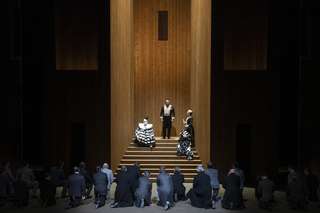|
Back
A Plethora of Masks! Geneva
Grand Théâtre
06/04/2019 - & June 7*, 11, 13, 16, 19, 22, 2019
Giuseppe Verdi : Un ballo in maschera
Ramón Vargas (Gustavo III), Franco Vassallo (Conte Anckarström), Irina Churilova (Amelia), Judit Kutasi (Ulrica), Kerstin Avemo (Oscar), Günes Gürle (Conte Ribbing), Grigory Shkarupa (Conte Horn), Nicolas Carré (Cristiano), Georgi Sredkov (Un servo d’Amelia), Nauzet Valerón (Il Primo Giudice)
Chœur du Grand Théâtre de Genève, Alan Woodbridge (Chorus master), Orchestre de la Suisse Romande, Pinchas Steinberg (Conductor)
Giancarlo del Monaco (Stage director), Richard Peduzzi (Sets), Gian Maurizio Fercioni (Costumes), Caroline Champetier (Lighting)

(© GTG/Carole Parodi)
Verdi’s Un ballo in maschera, composed in 1859 after the triumph of Rigoletto, Il trovatore and La traviata, is possibly the Italian composer’s most dramatically compact opera. Unlike most operas, it doesn’t have one superfluous note. Even more than some of his greater masterpieces, it represents a perfect marriage between music and lyrics. Given this privileged position, it offers the stage director a wealth of possibilities. Giancarlo del Monaco’s staging for Geneva’s Grand Theatre reveals a cynical vision. Indeed, the idea of disguise is more prevalent than the obvious costume ball in the last act. King Gustav III sees the soothsayer Ulrica while disguised as a fisherman. Amelia, wife of his minister and best friend Count Anckarström, also sees Ulrica wearing a veil to hide her identity. She is again veiled while being escorted from her encounter with the King by her husband, the latter initially ignorant of her identity. Even the role of the page Oscar, though undisguised, is one of the last uses of anachronistic “trouser” roles in romantic opera (to emphasize the page’s young age, frivolity and above all sexual ambiguity). All these elements seem to have galvanized del Monaco’s vision of the work.
Few may know the etymology of the word “maschera” in Italian and its English equivalent “mask”. It is derived from the Arabic word “maskara” meaning buffoonery and/or harsh derision. Indeed, a closer look at Un ballo in maschera reveals a more caustic degree of bite far beyond the final act’s famous masked ball. Amelia seeks help from the soothsayer to rid herself of her passion for the King, only to be overheard by the latter, thus confirming the reciprocity of his love. Forced by her husband to draw the card designating the King’s assassin, Amelia ends up picking her own husband. Gustav II, historically known for his homosexuality, dies for a passion never consumed.
Richard Peduzzi’s sets and Maurizio Fercioni’s costumes do not do justice to the work. The updating of the period from late 18th centrury Sweden to the early twentieth century seems bewildering, as none of the intrigue withstands the revision: witchcraft would not lead to severe punishment; a presumed infidelity may be cause for divorce and shared custody, not banishment; there would be little cause for Count Anckarström’s “Eri tu che macchiavi quell’anima” and Amelia’s “Morrò, ma prima in grazia”. Most bewildering was del Monaco’s reverting to Verdi’s original Swedish setting rather than the much more common Boston version. Yet there was no reference to that period. The usual Boston-based Riccardo, Renato and Amelia would have sufficed. Indeed, the text often sounded absurd: “Renato rivedrà la sua patria”. Perhaps Sweden had overseas provinces to which Count Anckarström would have returned! Revision and innovation are welcome provided they serve the opera’s lyrics.
Vocally, Irina Churilova as Amelia was the most outstanding singer in the relatively good cast. A true lirico-spinto with beautiful legato, Churilova’s voice has the rare quality of possessing a natural trill in addition to a beautiful timbre and expressive singing. Moreover, her Italian diction was superlative, especially as compared to most of her co-stars. Baritone Franco Vassallo was a moving Count Anckarström; his diction is clear and his acting exemplary. Tenor Ramón Vargas was ill at ease as the King Gustav III, a role too heavy for his once light tenor voice. Previously a Mozart specialist, he opted to sing the Verdi-Puccini repertoire though it was unsuitable, thus damaging a once beautiful voice. One could sense his caution throughout the role. The sensational duet “Teco io sto” was unusually ineffective, mainly due to Vargas’s caution. Only in the last act did the tenor let go, gifting us some first rate singing in the aria “Ma se m’è forza perderti”. Despite approximate Italian diction, Romanian mezzo Judit Kutasi was more than adequate as Ulrica. Her pleasant mezzo isn’t the ideal darker contralto best suited for the role. However, her acting was convincing and her stage presence imposing. Kerstin Avemo’s small white voice was suited for the sexually ambiguous role of the page Oscar. Her act I aria “Volta la terrea fronte alle stelle” was somewhat tepid, but her act III aria “Saper vorreste” was effervescent and thrilling. Best of all, her postures and movement on stage were convincingly boyish. The smaller roles of the plotters Conte Horn and Cristiano were well performed by Grigory Shkarupa and Nicolas Carré respectively, both in fine voice, affording an impressive Act III trio “Dunque l’onta di tutti sol una” with Vassallo.
Gian Maurizio Fercioni could be lauded for the effectiveness of his sing-through masks, but theatrically they were disastrous. Yes, one possibly understands del Monaco’s reference to treason and duplicity by having all characters at the Act III masked ball wear similar masks. However, an entire act with masked chorus and principals is overkill. The public cannot see the protagonists’ expressions, nor can the singers see each others’ expressions. Assuredly, this leads to an insipid finale to the opera. The superb playing of L’Orchestre de la Suisse Romande under Pinchas Steinberg’s alert baton kept one immersed in Verdi’s masterpiece. Were it not for this excellence, laughter would have been more likely. Happily, and despite the flaws of this production, one was moved by the timelessly heart-wrenching finale.
Ossama el Naggar
|